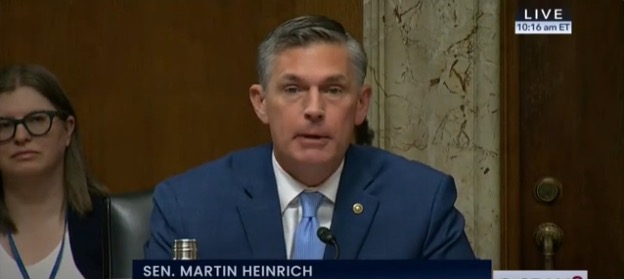Heinrich to Interior Nominee: “I hope you will join me in keeping public lands in public hands”
WASHINGTON – During his opening remarks to consider Governor Doug Burgum for the U.S. Secretary of Interior, U.S. Senator Martin Heinrich (D-N.M.), Ranking Member of the Senate Committee on Energy and Natural Resources, emphasized the need for the U.S. Secretary of Interior to protect our nation’s public lands, waters, and wildlife and fulfill our nation’s promises to Tribal Nations.
VIDEO: Heinrich Delivers Opening Remarks in Hearing to Consider Burgum for Interior Secretary
Heinrich also highlighted the necessity for the incoming Interior Secretary to address and mitigate the effects of climate change, particularly as we see the horrific wildfires in California, and long-term aridification of the Western U.S. Lastly, Heinrich stressed the need for steadfast leadership at the Interior Department to garner our public lands’ clean energy potential to create jobs, build new economic opportunities, and meet growing energy demands in New Mexico and across the country.
“There are some who argue that the very existence of public lands—places like Yosemite National Park or the Bitterroot National Forest — is unconstitutional,” Ranking Member Heinrich said. “But Americans know that idea of lands that belong to everyone, no matter where they live or who their parents are or how thick or thin their wallet is, is one of the foundational ideas of our nation. I hope you will join me in keeping public lands in public hands.”
Senator Heinrich’s full remarks as prepared for delivery are below.
Governor Burgum, welcome to the Energy & Natural Resources Committee.
We had a good conversation last week, and I’m looking forward to hearing your answers to our questions today.
I want to begin by acknowledging the horrific wildfires in California over the last couple of weeks.
My thoughts are with all those displaced by the fires and with every firefighter and first responder who is fighting to save these communities.
The Department of the Interior has responsibility for an incredibly broad array of issues — from conserving the places Americans love to spend time with their families, to protecting and recovering our most iconic wildlife species, to delivering water to cities and farms in the West, to fulfilling our nation’s trust responsibilities to Tribal Nations.
Any job that involves responsibilities ranging from elementary school students to bison is really quite the job.
Public lands are where we go to hike, camp, hunt, and fish.
They are where our veterans to go seek the peace and solitude that their service to our country could not always provide.
There are some who argue that the very existence of public lands — places like Yosemite National Park or the Bitterroot National Forest — is unconstitutional.
But Americans know that idea of lands that belong to everyone, no matter where they live or who their parents are or how thick or thin their wallet is, is one of the foundational ideas of our nation.
I hope you will join me in keeping public lands in public hands.
The Interior Department is also the leader in meeting our nation’s trust responsibility to Tribal Nations and upholding the treaty commitments we as a nation made to tribes and their members.
As a nation, we routinely fall short of meeting those commitments. We can and must do better.
As the relentless pace of climate change brings bigger floods, hotter summers, and diminished snowpack, it’s also driving the long-term aridification of the Western US.
Over the next 50 years, New Mexico will have 25 percent less water than we do today.
And we are not alone.
The Colorado River, which provides drinking water to 40 million people, irrigates billions of dollars’ worth of crops, and provides essential habitat for fish and wildlife, will likely never return to its early 20th Century flows.
Through the Bureau of Reclamation, the Department of the Interior must play an active role in helping the West transition to our new water reality.
The Interior Department is also an energy department.
As we make the necessary transition to a clean-energy economy, the land and water managed by the department will play an indispensable role in producing the energy we need — as well as facilitating the transmission lines that are essential to meet surging demand in electricity.
From geothermal and hydrogen to solar and wind energy, the Department’s work is at the center of our energy future.
Governor, I look forward to hearing your plans on all these topics and more.
###
